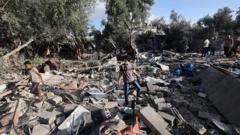Should MPs Have the Power to Veto Action on the Iran Conflict?

Understanding the Role of UK Parliament in Military Engagements
The ongoing tensions between Israel and Iran have escalated recently, prompting significant geopolitical reactions, particularly from the United States and the United Kingdom. As military actions intensify, the question of parliamentary oversight in decisions regarding military involvement has come to the forefront of political discourse. Plaid Cymru, a political party in Wales, has called for MPs to have the opportunity to veto any plans for UK military involvement in the Israel-Iran conflict. This discussion raises important considerations about the balance between government authority and parliamentary democracy in matters of war and peace.
Recent Developments in the Israel-Iran Conflict
The conflict between Israel and Iran has been a long-standing issue characterized by deep-rooted animosities and geopolitical rivalries. The recent military actions, including U.S. bombings of three nuclear sites in Iran, have exacerbated the situation. Following the escalation of tensions over three weeks, the situation has become more precarious, with the potential for wider regional implications.
In response to the U.S. strikes, Prime Minister Sir Keir Starmer has advocated for de-escalation, emphasizing the need to stabilize the situation. His administration has distanced the UK from direct involvement in U.S. military actions, focusing instead on diplomatic efforts to reduce tensions in the region.
The Role of the UK Parliament
In the UK, the power to declare war and engage in military action traditionally rests with the government. However, this authority is increasingly being challenged by public sentiment and calls for greater parliamentary oversight. The argument put forth by Plaid Cymru underscores a growing demand for MPs to have a decisive role in military decisions, especially in the context of international conflicts like the one involving Israel and Iran.
The Importance of Parliamentary Involvement
There are several reasons why parliamentary involvement in military decisions is crucial:
- Democratic Accountability: Parliament represents the voice of the people. Allowing MPs to vote on military actions ensures that decisions reflect the will of the electorate, promoting transparency and accountability.
- Checks and Balances: Parliamentary scrutiny can serve as a check on executive power, preventing hasty or unilateral decisions that could lead to unintended consequences.
- Public Trust: Engaging Parliament in discussions around military interventions can foster public trust in the government’s decision-making process, particularly in sensitive matters involving national security.
The Risks of Military Escalation
As the Israel-Iran conflict intensifies, the risk of military escalation increases. Sir Keir Starmer has expressed concerns about the potential consequences of further military involvement, emphasizing that the UK must do everything it can to stabilize the situation. The stakes are high, and the implications of military action extend beyond immediate impacts, potentially leading to long-term regional instability.
Rhun ap Iorwerth, the leader of Plaid Cymru, has articulated that the recent U.S. attack on Iranian nuclear facilities was a mistake, warning of potentially catastrophic outcomes. His call for parliamentary oversight reflects a growing sentiment among various political factions that military engagements should not be undertaken lightly or without comprehensive debate and consideration.
The Consequences of Military Action
Military interventions can lead to a cascade of consequences, including:
- Humanitarian Crises: Conflicts often result in civilian casualties and humanitarian disasters, exacerbating the plight of those already suffering in war-torn regions.
- Regional Destabilization: Military actions can lead to broader regional conflicts, drawing in neighboring countries and destabilizing entire areas.
- Economic Costs: Engaging in military conflicts can divert resources from essential services and infrastructure, impacting the economy at home and abroad.
The Argument for a Parliamentary Vote on Military Action
Advocates for parliamentary votes on military actions argue that such measures are essential for democracy. They contend that critical decisions about war should not rest solely with the executive branch, particularly in cases with significant implications for national and international security.
By requiring a parliamentary vote, the government would be compelled to provide justifications for military actions, fostering a more informed public discourse. This approach could also help mitigate the risks associated with impulsive military decisions driven by political pressures or external influences.
International Perspectives on Parliamentary Oversight
Various democracies around the world have established frameworks for parliamentary involvement in military decisions:
- United States: While the President has the authority to deploy troops, Congress holds the power to declare war, ensuring a system of checks and balances.
- Germany: The German Bundestag must approve military deployments, reflecting its commitment to democratic oversight in matters of national security.
- Australia: The Australian Parliament is consulted on major military commitments, emphasizing the importance of public representation in defense matters.
These examples illustrate that parliamentary involvement in military decisions is not merely a theoretical consideration; it is a practical approach adopted by many democratic nations to ensure accountability and transparency.
The Future of Military Engagement in the UK
As the global landscape continues to evolve, the UK must navigate complex international relationships while maintaining its commitment to democratic principles. The calls from Plaid Cymru and other political factions for parliamentary oversight in military decisions signal a shift in public sentiment regarding the role of government in issues of war and peace.
Going forward, it will be essential for the UK government to engage in meaningful dialogue with Parliament and the public. Establishing a clear framework for parliamentary approval of military action could lead to more comprehensive debates and better-informed decisions that reflect the values and priorities of the British people.
Conclusion
The conflict between Israel and Iran presents a critical juncture for the United Kingdom as it contemplates its role in international military engagements. The calls for parliamentary oversight highlight an essential aspect of democracy—ensuring that the voices of the electorate are heard in decisions that could have far-reaching consequences.
As the situation develops, it is imperative for both the government and Parliament to work collaboratively to prioritize diplomatic solutions and the stabilization of international relations. The future of military engagement in the UK will depend on a commitment to democratic principles and a cautious approach to conflict resolution.
FAQs about UK Military Involvement and Parliamentary Oversight
What is the role of the UK Parliament in military decisions?
The UK Parliament traditionally has limited direct power over military decisions, as the executive branch holds authority. However, there is a growing call for Parliament to have a say, particularly through votes that could prevent hasty military actions.
Why is parliamentary oversight important for military interventions?
Parliamentary oversight is crucial for ensuring democratic accountability, providing checks on executive power, and fostering public trust in the government's decision-making process regarding military actions.
What are the potential consequences of military action?
Military actions can lead to humanitarian crises, regional destabilization, and significant economic costs, impacting both the countries involved and the broader international community.
How do other countries approach parliamentary oversight of military engagements?
Many democracies, including the United States, Germany, and Australia, have established frameworks for requiring parliamentary approval or consultation before engaging in significant military actions, ensuring public representation in defense matters.
As the UK navigates its role in international conflicts, how do you think parliamentary involvement could shape future military engagements? #MilitaryOversight #ParliamentaryDemocracy #UKPolitics
Published: 2025-06-23 11:29:07 | Category: wales


